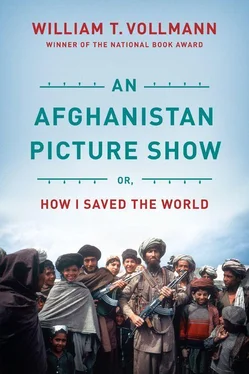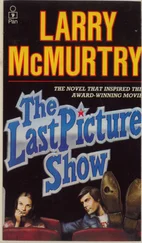“In the immediate future, no,” she replied, “in the long-term future, maybe. Look what’s happened with the Tibetan refugees. They get much less than the local population, because who’s interested in Tibetan refugees? But at the moment the donor countries are still extremely generous toward the Afghan refugees. But who knows what it’s going to be like in five years, ten years? And there are pockets of malnutrition throughout the frontier, but that’s not because they’re refugees; they have this cultural habit that you don’t feed solid foods to the infants until they’re around at least two years of age, bso it’s survival of the fittest. The strong ones live, and the weak ones”—she shrugged—“just die away.” —The Young Man nodded and gulped his tea. The fan in the office felt very, very nice. — “In some areas we’re trying to institute solid feedings to infants six months of age and older; it’s very difficult,” Marie Sardie said. “And the women, some of them, tend to be malnourished because of the repeated pregnancies; and also, as you know, the females in this part of the world have got absolutely no value at all. If the women keep producing female children, the husband doesn’t really care if the children die, or if the wife dies; you can always get another wife who hopefully will give you male children.”
THE MATTER OF WOMEN
Levi said that men sometimes parked their wives like cars when they went somewhere, eyes facing the wall, and left them there for two hours.
SUCCESS AT LAST
Marie Sardie had her own office and car and chauffeur so that it would be clear to all that she fulfilled the official functions of a man. But Mary McMorrow didn’t. Mary was an I.R.C. nurse.
“There was one camp where I was ordered not to return because their women were seeing me,” she said. “They were just seeing me. They’re mostly rural people who’ve lived in the hills or been out with their sheep all their lives, and this is new: when they see a woman coming in driving a car, when they see a woman telling someone something and they’ll do it for her, it causes them a lot of trouble.”
At noon the Young Man accompanied Mary to a dispensary tent through whose square sun-choked doorway little brown boys with cropped heads stood staring with dark eyes, frowning or sucking thumbs; behind them old men in white squatted patiently; and inside sat a weary pretty health worker in white, her desk being the white-covered examination table upon which lay her scissors in a steel box of disinfectant, her squeeze bottle of alcohol, her tray jumbled full of cotton and pills; and a refugee, tanned, handsome, unshaven, came before her and was awarded his TB medication, and then came another and another. Only 64 children had been vaccinated since morning. Mary said that in Thailand her team had vaccinated 500 a day. The Pakistani administrator used the phrase “motivation” defensively. A driver was being bawled out for misusing a truck. There was an argument about receipts, which went on and on in the 110° heat. Mary walked up, grabbed two or three children at random, and looked at their arms. All vaccinated; everything was okay. — From the window of the tent could be seen a well, a mosque (which resembled a tin-roofed barn), a dirty mother with her dirty infant, and dirty staring children, one without pants.
“The vaccines aren’t being kept cool enough,” Mary said.
“It’s not my fault!” shouted the immunologist, who was Pakistani. He began barking orders. “Everything here is no good,” he said. “We don’t have enough of anything! Why won’t the Americans give more funds for the refugees?”
“Pakistan refused the aid before,” Mary said. “The Americans went ahead and spent the money on something else.”
“Well, the U.S. should manage its money better,” said the immunologist triumphantly. He stared Mary in the face.
STATEMENT OF MARY McMORROW, I.R.C. NURSE
“The women are the most neglected, the women are the most anemic, the women have the highest level of tuberculosis; the women in general are in pretty bad shape,” said Mary. “According to our standards, they’re treated pretty bad. According to their standards, they’re treated as they expect to be treated. Traditionally, the Afghan men get the best of the food, which is then passed down to the children, and the women eat last, what’s left over, if anything. There are certain long-standing taboos: women in some of the tribes won’t eat meat or vegetables, because they think they’re bad for them. So what they basically live on is sweet bread and green tea.
“A woman’s life is really less than an animal’s. A camel or a water buffalo is valued more than a woman in this society. You can’t get a husband to donate blood for his wife because if you take his blood you take his life, but if she dies he can always get another wife.
“Last week a woman delivered her baby, but retained the placenta for more than twenty-seven hours, which is a very serious — lethal — problem. You continually bleed. It was just herself and this little old lady who happened to be around. And by the time we found her she was in shock from loss of blood. We had to rehydrate her; we had to give her drugs to stabilize her blood pressure; we had to do a lot of heroics to keep this woman alive. And, you know, we stabilized her and she was on her way to recovery and her husband came in (it was the first time that we had seen him in the five hours that we were in the tent). And the only thing he had to say was, ‘How am I going to get water since she is useless for me?’ ”
THE POINT OF IT [1]
But unlike me, Mary accomplished something. She had saved that woman. She taught mothers to breast-feed longer, to mash bananas and feed them to their little children…
A SENSE OF ACCOMPLISHMENT
“So maybe attempts to make them more self-reliant haven’t been a complete failure?” asked the Young Man so hopefully.
“There have been no real attempts to make them more self-reliant,” Marie Sardie said. “Any such attempts have been on the refugees’ own initiative. It’s very difficult, because in the beginning you’re just trying to alleviate your own caseload. You give them goods, like charity. You kill their pride and integrity; you make them professional beggars and parasites. When you give them something for nothing, why should they work for it? But those refugees who are interested in doing their own thing do it. They help out in the dispensaries and with the distributions; they help the staff. Because basically they’re bored. They’re fed and watered and clothed, so what can they do with their time except look at the empty space? So a lot of them have set up little kitchen gardens and shops where you can buy food and cigarettes, detergents and soap …”
HAPPINESS [5]
After his return from Hangu, the Young Man was very sick. Mary and Levi had him over and fed him. In the middle of the meal he had to go to the bathroom a couple of times, and Mary said, “You don’t have to eat anything if you don’t want to.” Then for once he had a wonderful sense of ease and freedom. He didn’t have to please anybody and do anything, even though the Roos were said to be embarking on much construction now, in Kabul, in Herat, Mazar-i-Sharif … Bases and houses, the Afghans said. At Hairaton they were building a city of a hundred thousand people. The Mujahideen were losing control of many large cities. In Herat they were still partially in control of the airport, but Shindand was completely in the hands of the Roos . Kailagai was the place where the Russians built their weapons and bullets. It had been a muddy and dusty area. Now the whole area is covered with metal! a man told me in wonder. There are airplanes and tanks there; it had become a staging area for Soviet troops. The Roos had a factory there; they dug up entire hills to use for their manufacturing, people said. But he could do nothing; he relaxed and had a bowl of Mary’s soup and drank one of Levi’s beers and felt incredibly happy.
Читать дальше












